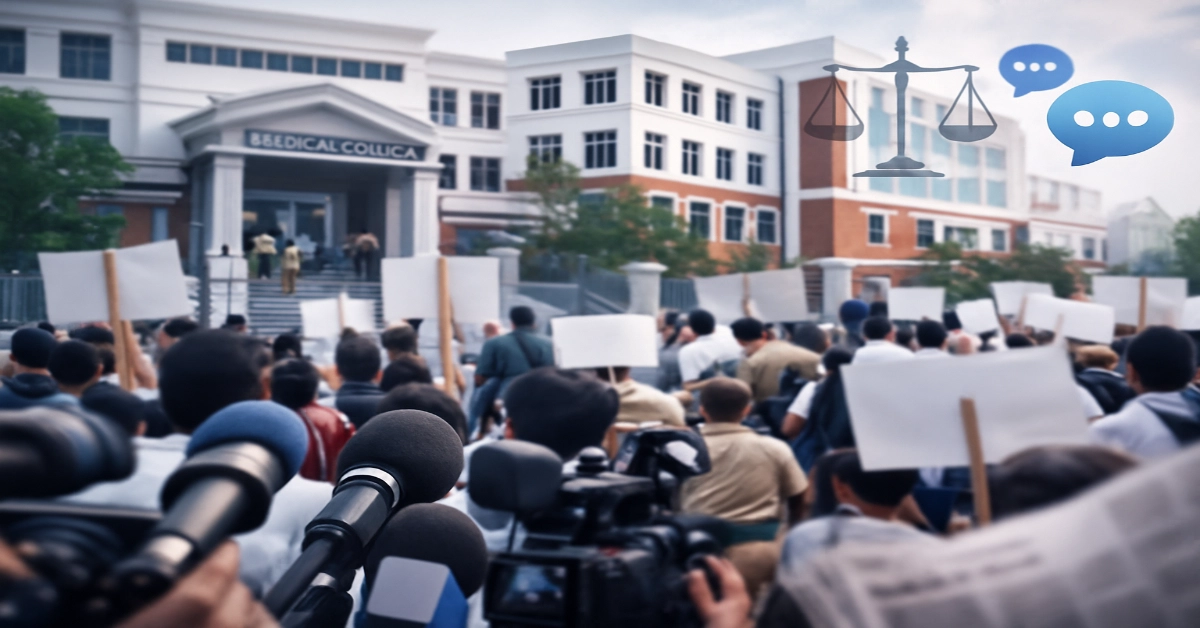Vaishno Devi Medical College Seat Allocation Controversy: The seat allocation controversy at Shri Mata Vaishno Devi Institute of Medical Excellence (SMVDIME) in Reasi, Jammu & Kashmir, has escalated very quickly. From some Hindu organisations to political leaders, every one had jumped into the debate on whether institutions run and funded by religious trusts or organisation should reserve seats for students belonging to that religion.
Rashtriya Bajrang Dal president Rakesh Bajrangi said that out of the 50 seats in the first batch, 42 were allotted to Muslim students, while only seven were Hindu and one Sikh. He said the organisation finds this distribution unacceptable and is demanding a fresh admission process along with a review of the current rules to ensure greater representation for Hindu students.
How the Controversy Began
The debate surfaced shortly after the institute published its first list of admissions for the 2025-26 academic year. 42 of 50 students, were from the Muslim community, with seven Hindu students and one Sikh candidate.
This triggered strong reactions from various groups, particularly those who argued that an institution funded by donations to the Vaishno Devi Shrine Board should reflect the sentiments of the devotees whose contributions support the institution.
Social Media Outrage and Trend Waves
Within hours of the list being public, platforms such as X (formerly Twitter), Facebook, and WhatsApp groups saw a trending posts from political leaders and multiple organisations.
The themes across trending posts included:
- Claims of “religious imbalance”
- Questions over transparency in admissions
- Calls to review or revoke the list
- Demands for minority institution status
Some users shared emotional appeals, while others counter-argued that merit, not religion, must remain the determining factor in a national entrance system governed by NEET UG rules.
The debate quickly polarised into two dominant narratives:
- One advocating for representation aligned with shrine tradition, and
- The other defending constitutional merit-based selection.
Student Groups and On-Ground Protests
The situation escalated when organisations including the Yuva Rajput Sabha, Rashtriya Bajrang Dal, and Movement Kalki held protests outside the college campus.
They argued that the allotment was “unacceptable” and demanded a fresh admission process and legislative intervention to ensure that Hindu representation was prioritized. Some called for SMVDIME to be declared a minority institution for Hindu students, a proposition without legal precedent in the current regulatory framework.
Political Response
The issue gained further momentum when a delegation of BJP legislators, led by Leader of Opposition Sunil Sharma, met Lieutenant Governor Manoj Sinha, who also serves as the chairman of the Shrine Board.
The delegation submitted a formal memorandum demanding:
- A review of the admission norms
- Corrective measures
- Greater transparency
- Consideration of religious representation
Sharma argued that a shrine-funded institution should reflect the spiritual identity and expectations of the devotees whose donations support it.
Other BJP leaders, including MLA RS Pathania, stated online that institutions funded from the offerings of Mata Vaishno Devi pilgrims must function in alignment with the shrine’s “sacred ethos.”
Government Clarifications and Counterstatements
Amid growing public pressure, Jammu & Kashmir Chief Minister Omar Abdullah addressed the issue publicly, calling the debate “an unnecessary controversy.”
He reiterated that:
- Admissions were made on the basis of merit, not religion
- No provision existed, past or present, for religion-based restrictions
- The Constitution and NEET guidelines mandate equal opportunity
Abdullah further said,“At the time the institute was sanctioned, it was clearly stated that admissions would be merit-based. Now that the selections are merit-based, some people have objections.”
Officials from the institute and regulatory bodies also maintained that no religion-based reservation exists under NEET UG rules, and SMVDIME does not hold minority status of any kind.
National Debate
Once political statements and protests entered public discourse, mainstream media houses, including India Today, PTI, and TNIE, began reporting updates. The narrative evolved from a regional admission dispute into a national conversation touching upon larger themes:
- Should religious institutions influence admission priorities?
- Can donor expectations override constitutional merit-based selection?
- Where does NEET policy stand when public sentiment clashes with admission outcomes?
Coverage varied, from factual reporting to strongly opinionated segments, contributing to the rapid escalation of visibility.
Where the Situation Stands Now
Lieutenant Governor Manoj Sinha has assured stakeholders that the issue is being examined at the administrative level, and an appropriate decision will be taken. However, no official changes to the admission list or policy have been announced.
Meanwhile, protest groups have warned they will intensify agitation if their demands are not addressed, whereas supporters of merit-based admissions continue to defend the existing process.
A Test Case for Public Accountability in Admissions
The seat allocation controversy at Vaishno Devi Medical College reflects broader national questions surrounding:
- The balance between faith-based expectations and constitutional values
- Transparency in NEET admissions
- The role of media and public sentiment in academic governance
Whether this incident leads to policy reform, clarification, or simply serves as a temporary flashpoint, it has already established itself as a significant moment in India’s ongoing conversation about fairness, secularism, and equity in education.

